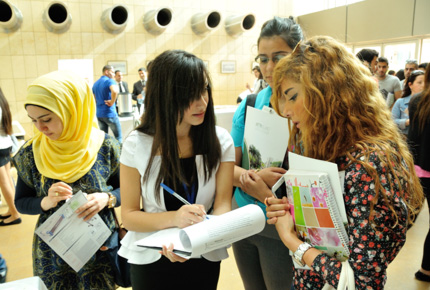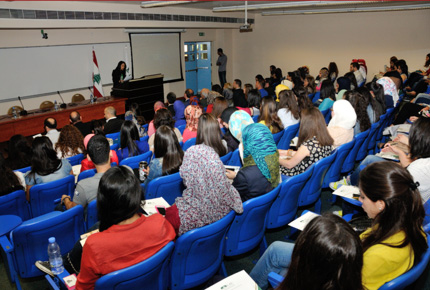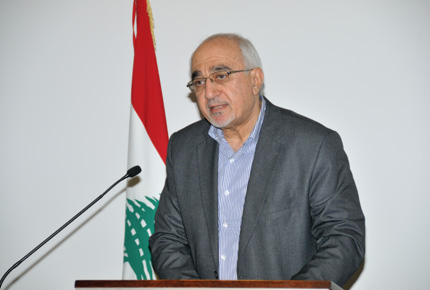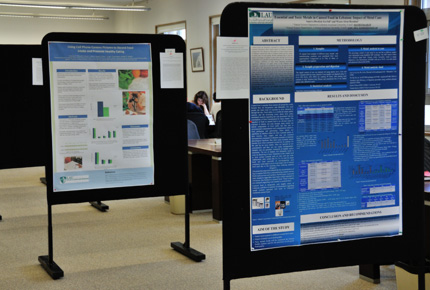LAU, a fertile ground for nutrition and food research
Experts gather at LAU’s first Nutrition and Food Research Day Symposium to discuss trends and challenges in the Middle East.

Keynote speaker Sylvia Escott-stump is a leading authority and author in the U.S. on nutrition and dietetics. In her talk, she addressed the different challenges that today’s dietitians currently face and will meet in the future and how to cope with them.

There was a general consensus that political action needs to be taken to put Lebanon on a safer course.

The symposium provided an opportunity to present the latest original research from Lebanon and around the region that address the challenges and trends of the Middle East.
The recent alarming increase in the prevalence of nutrition and food related health problems in Lebanon and the Middle East has established the Arab countries as world leaders in obesity associated diseases. The lack of research studies and collaboration in the field is coupled with the need to tackle food safety and food insecurity challenges that are spreading in a region whose countries are facing abrupt economic, political and demographic changes.
Measuring the crucial importance of a serious national and regional dialogue, LAU, under the auspices of the Department of Natural Sciences, held its first Nutrition and Food Research Day Symposium on April 25.
“We want to bring researchers from Lebanon and the Middle East together to share their findings and foster inter-university collaboration in this regard,” says Dr. Maya Bassil, assistant professor and coordinator of the event.
The event allowed for numerous short technical presentations by national and international scholars that allowed participants to inform and get informed about a diversity of topics.
Dr. Sylvia Escott Stump, an internationally recognized author and consultant in nutrition, presented the latest trends in etiology and treatment of obesity. In her talk about the complex management of obesity, Stump gave recommendations on how to identify behavioral and biological causes of obesity in order to address this epidemic and its related diseases.
Tackling the importance of health and nutrition from a different angle, Dr. Bruno Minjauw, FAO Representative for Lebanon, talked about the regional decline in food security which is getting less people to have physical, social and economic access to sufficient, safe and nutritious food. “The Syrian crisis, together with the fact that Lebanon’s economic growth has been declining since the year 2011, have led to 8% of the total population to be food insecure, with disparities within governorates.”
Further adding to such worrisome situation, food safety scandals regularly hit the headlines and many Lebanese do not know the potential dangers lurking in their food, says Assistant Professor Hussein Hassan.
“Even in advanced countries, food-borne illnesses can and do occur—however, in Lebanon we do not have the proper legislation or enforcement mechanisms to put in place serious and effective food safety measures,” he explained adding that as a result continuously raising awareness among the population is key.
To illustrate his talk, Hassan presented an original research conducted at LAU that demonstrates that while the youth of Lebanon show varying degrees of food safety knowledge, they are less likely to translate that knowledge into action.
“What I liked about this event was that while it stressed the importance of getting political will at the top to support legislative change, it reminded us that we, as individuals, have to take our responsibilities too,” said second-year nutrition student Seema Sbeie.
More
Latest Stories
- Quality of Life on Hold: Multiple Sclerosis Care During Lebanon’s Economic Crisis
- AKSOB Launches Three New Executive MBA Certificates
- Blending Coding Education With Career Exploration
- LAU Alumnus Helms Seminar on Entrepreneurship and Sustainability
- On Point Celebrates Student Innovation and Commitment to Accreditation
- LAU Kicks off the Seventh Season of the Jr. NBA League
- Bridging Policy, Science and Society to Tackle Lebanon’s Environmental Challenges
- Understanding a Core Security Gap in Drone Operations


